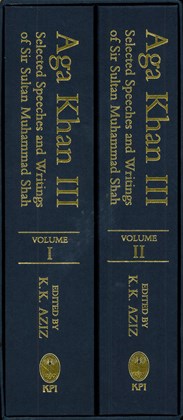Aga Khan III Selected Speeches and Writings of Sir Sultan Muhammad Shah
Kegan Paul
Aga Khan III (1877–1957) was the 48th Imam of the Shiʿi Ismaili Muslims. Through his knowledge of Eastern as well as Western cultures, he was uniquely placed to play a significant role in the international affairs of this time.
The long public career of Aga Khan III had many dimensions. He was a social reformer whose concerns included the alleviation of rural poverty and the uplift of women in society. An advocate of modern education, he supported male and female educational advancement in India and East Africa, and played a key role in the development of the Muslim University of Aligarh. He advocated a truly multicultural education blending the best of Western and Eastern literary classics. He was a champion of amity between nations and peoples and in India he supported the idea of Hindu-Muslim unity, reminding both that India was their common parent. On the international scene he strove for world peace, and in 1937 was elected president of the League of Nations.
This monumental work, covering the years from 1902 to 1955, represents the first systematic compilation of the speeches and writings of Aga Khan iii in the first half of the 20th century. Among the topics covered are constitutional progress in India, education, rural development, Hindu-Muslim unity, Indians in Africa, the renaissance of Islamic culture, the importance of science and technology, the status of women, Islam in the modern age and Pan-Islamism. Professor K.K. Aziz has added a valuable introduction.
Volume I: 1902–1927
Volume II: 1928–1955

